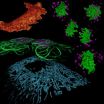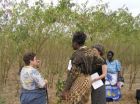ArcticNet recommends practical solutions to improve standard of living in Canada's north
Get access to Canada's top research talent at the AAAS annual meeting
2013-02-17
(Press-News.org) February 17, 2013 - Boston, MA – Northern communities are in the midst of a period of intense and rapid change brought on by modernization, industrialization and the realities of climate change. From preserving the means to hunt caribou to protecting stocks of arctic char - balancing development with a respect and preservation of traditional means of sustainability may be key to improving standards of living in the North.
With the help of the icebreaker Amundsen, Louis Fortier, Canada Research Chair on the Response of Arctic Marine Ecosystems to Climate Change and other members of the ArcticNet team conduct complex assessments of different Arctic regions, including Nunavik in northern Quebec and Nunatsiavut in Labrador.
Their findings about the effects of modernization, industrialization and climate change, form the basis of a series of recommendations that were recently published in high-profile impact study on the region.
Arcticnet's recommendations include improving management of large caribou herds, expanding monitoring of water quality, protection of berry production areas, assessing the sustainability of arctic char and improved weather forecasting in the region.
It is a practical roadmap that could have a real positive impact. With high rates of addiction, negative health outcomes and a life expectancy 10 years lower than the rest of Canada, it is critical that communities in the north find solutions. Fortier believes that science can help provide a guide.
"Scientific facts must inform policy and decision and, for that to happen, scientists must increasingly team up directly with stakeholders and policy makers, especially at the community and region levels where strategies to adapt are acutely needed" said Fortier.
Fortier created ArcticNet to generate the knowledge to inform policies and strategies for dealing with the effects of climate change. From the top of the Arctic Circle to Washington, D.C., and beyond, the discoveries Fortier and ArcticNet are making point the way for nations not only to anticipate but manage the changes affecting northern regions.
A full version of the impact report is available upon request.
Louis Fortier will be speaking as part of the Canada press breakfast event at the American Association for the Advancement of Science annual meetings in Boston. Members of the media can attend his session Sunday, February 17 at 7:45 am in room 200 at the Hynes Convention Centre.
###
For more information about Prof. Fortier and ArcticNet's research, or for an interview, please contact:
Ryan Saxby Hill
Canada Foundation for Innovation
ryansaxbyhill@innovation.ca
613-294-6247
About the Canada Foundation for Innovation
The Canada Foundation for Innovation gives researchers the tools they need to think big and innovate. By investing in state-of-the-art facilities and equipment in Canada's universities, colleges, research hospitals and non-profit research institutions, the CFI is helping to attract and retain the world's top talent, to train the next generation of researchers, to support private-sector innovation and to create high-quality jobs that strengthen the economy and improve the quality of life for all Canadians. For more information, visit innovation.ca.
ELSE PRESS RELEASES FROM THIS DATE:
2013-02-17
February 17, 2013 — Boston, MA — With nearly 20 percent of the United States experiencing an extreme drought, the damage from Hurricane Sandy estimated at $65 billion and farmers in Canada's Prairies struggling with the effects of 2011's devastating flooding, the importance of water security in North America is impossible to overstate.
At the Global Institute for Water Security at the University of Saskatchewan, director Howard Wheater and his team use the Saskatchewan River Basin as a large-scale case study to generate the science underpinning the policies and practices ...
2013-02-17
BOSTON, MA -- Rats can't usually see infrared light, but they have "touched" it in a Duke University lab.
The rats sensed the light as a sensation of touch after Duke neurobiologist Miguel Nicolelis and his team fitted the animals with an infrared detector wired to electrodes implanted in the part of the mammalian brain that processes information related to the sense of touch.
One of the main flaws of current human, brain-controlled prosthetics is that patients cannot sense the texture of what they touch, Nicolelis said. His goal is to give quadriplegics not only the ...
2013-02-17
BOSTON, MASS.—When difficult biological questions are tackled by creative experts in physics, what can result?
Images of great beauty, accessible for anyone to appreciate, that also offer rich information on fundamental life processes, and rewarding new paths for analysis and insight.
This leading edge of interdisciplinary collaboration in microscopy will be explored in "Innovations in Imaging: Seeing is Believing," Saturday, February 16, 1:30-4:30 PM at the AAAS Annual Meeting in Boston.
The panel will feature three physicists and three biologists, several of ...
2013-02-17
CHAMPAIGN, Ill. — Exercise doesn't only strengthen your heart and muscles – it also beefs up your brain. Dozens of studies now show that aerobic exercise can increase the size of critical brain structures and improve cognition in children and older adults.
University of Illinois psychology professor Art Kramer, a nationally recognized expert on the role of physical fitness on cognition, will discuss these brain-changing outcomes at a session of the 2013 meeting of the American Association for the Advancement of Science in Boston on Feb. 16. Kramer is the director of the ...
2013-02-17
In his Feb. 12 State of the Union address, President Obama singled out climate change as a top priority for his second administration. "We can choose to believe that Superstorm Sandy, and the most severe drought in decades, and the worst wildfires some states have ever seen were all just a freak coincidence," he said. "Or we can choose to believe in the overwhelming judgment of science – and act before it's too late."
Four years ago, the president addressed rising global temperatures by pledging a 17 percent cut in carbon dioxide (CO2) and other greenhouse gas emissions ...
2013-02-17
UNIVERSITY PARK, Pa. -- Hairless skin first evolved in humans as a way to keep cool -- and then turned into a canvas to help them look cool, according to a Penn State anthropologist.
About 1.5 to 2 million years ago, early humans, who were regularly on the move as hunters and scavengers, evolved into nearly hairless creatures to more efficiently sweat away excess body heat, said Nina Jablonski, Distinguished Professor of Anthropology. Later, humans began to decorate skin to increase attractiveness to the opposite sex and to express, among other things, group identity.
"We ...
2013-02-17
BOSTON — Through research led by Michigan State University, crop yields have increased dramatically. The children of Ekwendi, Malawi, also have gained weight and are taller. These improvements bring smiles to Sieglinde Snapp, MSU ecologist, and other researchers who have worked in Malawi for many years.
Snapp, a crop and soil scientist at MSU's Kellogg Biological Station, shared the secrets of the initiative's success at the annual meeting of the American Association for the Advancement of Science Feb. 14-18 in Boston.
One of the focal points of her research has been ...
2013-02-17
The news sounds grim: mounting scientific evidence indicates climate change will lead to more frequent and intense extreme weather that affects larger areas and lasts longer.
However, we can reduce the risk of weather-related disasters with a variety of measures, according to Stanford Woods Institute Senior Fellow Chris Field.
Field will discuss how to prepare for and adapt to a new climate at the annual American Association for the Advancement of Science (AAAS) meeting in Boston. Field's talk, "Weather Extremes: Coping With the Changing Risks," will be part of a symposium ...
2013-02-17
Canine Colors, a subsidiary of True Colors International, features a unique new exhibit at the 4th annual Wisdom 2.0 conference on Feb. 21 through Feb. 24th at the Concourse Exhibition Center in San Francisco, Calif. where thought leaders from business and technology come together to share their insight on how to connect with our non-digital selves and using technology in ways enhance our well-being, making us effective and useful to the world.
"This is a great corporate tool for employee engagement and team building. We want our employees to bring their whole self ...
2013-02-17
Stanbridge College, a technical college that offers Masters, Bachelor and Associate of Science degrees and diploma programs in Allied Health and Information Technology, nursing student, Vanessa Gonzalez-Arroyo raised over $6,000 for the Leukemia & Lymphoma Society. The full-time nursing student, worked with in Team in Training, a non-profit organization that trains runners, walkers, triathletes, cyclists and hikers to support cancer research, to participate in two events: a marathon in San Diego and a hike in Yosemite where she raised $2,743 with over 40 donations and ...
LAST 30 PRESS RELEASES:
[Press-News.org] ArcticNet recommends practical solutions to improve standard of living in Canada's north
Get access to Canada's top research talent at the AAAS annual meeting


